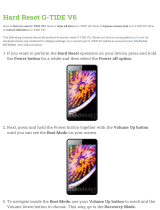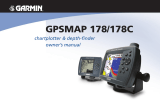
Table of Contents
Introduction ...........................................................................i
Caring for the GPSMAP 378/478 ........................................... iv
Warnings .................................................................................. v
Important Information ............................................................ vi
Battery Warnings .................................................................... vi
Getting Started .....................................................................1
Unit Overview .......................................................................... 1
Charging the GPSMAP 378/478 .............................................. 2
Turning On the GPSMAP 378/478 .......................................... 3
Getting Satellite Signals ......................................................... 4
Using the GPSMAP 378/478 Keypad...................................... 7
Using the GPSMAP 378/478.................................................... 8
Using Simulator Mode .......................................................... 12
Marine Mode .......................................................................13
Marine Mode Pages ............................................................... 13
Navigating to a Destination .................................................. 14
Finding an Item ...................................................................... 17
Creating and Using Routes .................................................. 20
Creating and Using Waypoints ............................................ 24
Managing Your Tracks .......................................................... 34
Marine Mode Pages ...........................................................38
Map Page ................................................................................ 38
Compass Page ....................................................................... 45
Highway Page ........................................................................ 48
Active Route Page ................................................................. 50
Position Data Page ................................................................ 51
XM Audio Page ...................................................................... 52
Automotive Mode ..............................................................56
Automotive Mode Pages ....................................................... 56
Navigating in Automotive Mode ........................................... 57
Editing Your Route ................................................................ 60
Following an Automotive Route ........................................... 63
Automotive Mode Pages ...................................................64
Map Page ................................................................................ 64
Current Route Page ............................................................... 65
Trip Computer Page .............................................................. 66
Main Menu ..........................................................................67
Main Menu Tabs ..................................................................... 67
GPS Tab .................................................................................. 68
Weather Tab ........................................................................... 68
XM Tab .................................................................................... 69
Route Tab ............................................................................... 70
Points Tab .............................................................................. 70
Track Tab ................................................................................ 71
DSC Tab .................................................................................. 71
Sonar Tab ............................................................................... 75
Alarms Tab ............................................................................. 76
Calendar Tab .......................................................................... 78
Celestial Tab........................................................................... 79
ii GPSMAP 378/478 Owner’s Manual
IntroductIon > tAble of contents





















